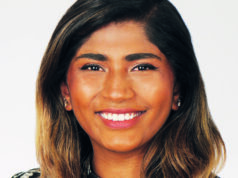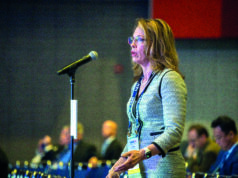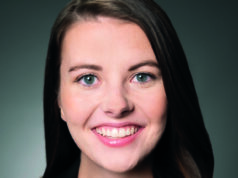
Over a one-year period, Association of American Medical Colleges data showed that 25% of women in surgery reported experiencing disrespect based on their gender, Melina R. Kibbe, MD, chair of the department of surgery at the University of North Carolina-Chapel Hill, told a recent Frank J. Veith International Society webinar that sought to address how to promote women in vascular surgery.
“We have a problem, and we have an issue,” Kibbe told a group of four fellow women vascular surgeon presenters and another five male colleagues invited as discussants.
In a talk that looked at barriers and strategies to becoming a chair of surgery, Kibbe identified key areas standing in the way of women, based on her own lived experience.
“For one, I will tell you that implicit bias against women is definitely still prevalent and exists in surgery,” she said. “I think, speaking here as a female leader, expectations of female leaders are different than those of male leaders. I think that female leaders are under the microscope much more than male leaders for their decision-making processes.
“I think that decisions that female leaders make are questioned and challenged more often than male leaders. I think that people try to manipulate female leaders more often than male leaders. Female leaders receive less overall support and encouragement, and support for female leaders I don’t think is as strong when going against the status quo.
“Female leaders are often not as recognized as their male counterparts. And I would also say female leaders are still subject to the stereotypical descriptors, for example, of being ‘difficult’ instead of ‘decisive and ‘authoritative.’ Or being ‘indecisive’ instead of ‘thoughtful.’”
She underscored how “significantly” underrepresented women are in positions of leadership in surgery.
“But, plenty of qualified women are there,” Kibbe added. “I do think women leaders face unique challenges, so we must become more aware of our implicit biases. As all of the other speakers have commented, we must actively think of and promote women into these positions of leadership to overcome these barriers.”
Following an introduction from Enrico Ascher, MD, executive director of the society, a robust session of five talks and associated discussion took place with moderation by Keith D. Calligaro, MD, chief of vascular surgery and endovascular therapy at Pennsylvania Hospital in Philadelphia, and Amy B. Reed, MD, professor and chief of vascular and endovascular surgery at the University of Minnesota in Minneapolis.
Venita Chandra, MD, program director of the vascular surgery residency and fellowship programs at Stanford University in California, spoke on ways to improve diversity at the conference podium.
“Clearly, a more diverse podium will result in improved discussion, an increased number of perspectives and opinions and increased innovation and research ideas,” she said.
“But there are other benefits as well. We all know that the people going into medicine today are changing. There’s an increasing amount of diversity in our medical students, and particularly an increasing number of women going into residencies in medical schools. Increasing diversity on the podium allows these young people to look up to the podium and see people who look like themselves.”
Among the other presenters, Ruth L. Bush, MD, associate dean for medical education at the University of Houston, took viewers on a journey through the barriers and strategies to being an academic editor.
Julie A. Freischlag, MD, the CEO of Wake Forest Baptist Health in Winston-Salem, North Carolina, discussed lessons she learned on the way to becoming the first—and to-date only—president of the Society for Vascular Surgery (SVS). Meanwhile, Edith Tzeng, MD, professor of surgery at the University of Pittsburgh Medical Center and chief of vascular surgery for the VA Pittsburgh Healthcare System, explored how to develop and retain women as vascular surgeon-scientists.
The discussants were Ali AbuRahma, MD, president-elect of the SVS; Peter F. Lawrence, MD, chief of vascular surgery at the University of California, Los Angeles (UCLA); Richard Powell, MD, chief of vascular surgery at Dartmouth-Hitchcock Medical Center in Lebanon, New Hampshire; Anton Sidawy, MD, chair in the department of surgery at George Washington University in Washington, D.C.; and Frank J. Veith, MD, professor of surgery at both New York University and the Cleveland Clinic College of Medicine.












